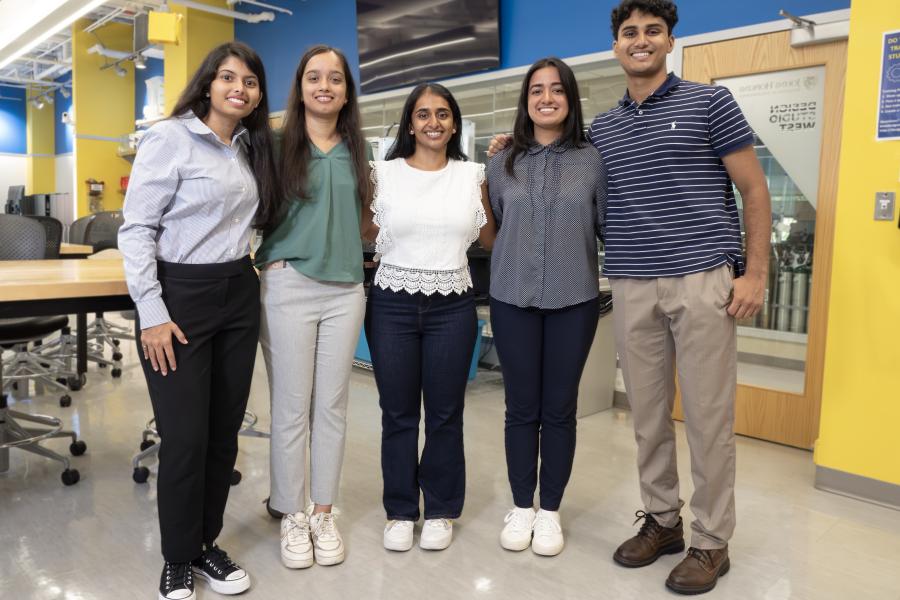- Name
- Hannah Robbins
- hlrobbins@jhu.edu
- Cell phone
- 667-232-9047
A team of Johns Hopkins University undergraduate biomedical engineering students is among the finalists selected to compete in the 2023 Collegiate Inventors Competition in Washington, D.C., next month.
The OnPoint Ventilation team—senior Sneha Batheja, junior Alexandra Gorham, senior Charlie Almoney, senior Ria Jha, junior Nina Nair, senior Arijit Nukala, and junior Krisha Thakur—created the Bronchosleeve, a novel catheter designed to reduce the complications associated with one-lung ventilation, or OLV, a common procedure in chest surgeries.
The team, one of five undergraduate finalists, will present its invention to a panel of judges from the National Inventors Hall of Fame and the U.S. Patent and Trademark Office on Oct. 24-25 for a chance at winning $10,000.
"Our team is hopeful that being a finalist for this award will create new avenues for us to further innovate, network with the right mentors, and ultimately bring this device to market so we can get it into the hands of every anesthesiologist," said Batheja, the team lead. "Our goal has always been first and foremost to help patients."
Each year, more than 600,000 patients undergo the OLV procedure, which involves an anesthesiologist ventilating one lung and deflating the other so a surgeon can access the chest cavity. This procedure is often fraught with challenges and risks; for example, current devices are bulky, difficult to insert, and can easily become dislodged.
According to Batheja, the device considered the "gold standard" for OLV has remained unchanged for more than six decades. However, the team recognized that many individuals could benefit from a new approach to this procedure. As a result, they began generating design concepts for an alternative OLV device that could enhance patient safety and potentially reduce surgical duration.
Their Bronchosleeve prototype simplifies the OLV procedure and reduces surgical complications; with a smaller diameter and enhanced visualization capabilities, their catheter is easier to insert and less likely to dislodge or move during the procedure.
Additionally, the device doesn't have to be removed and switched out for another device for postoperative care, which is safer for the patient and results in a better workflow for the anesthesiologist.
The students developed the prototype while enrolled in the Department of Biomedical Engineering's Undergraduate Design Team program, an 18-month long process that includes clinical immersion, problem identification and description, concept development and evaluation, prototyping and testing, and verification.
"We interviewed more than 150 clinicians, patients, and all the possible stakeholders that understand and are impacted by this problem," Jha said. "We went into the OR and shadowed these procedures so we could see firsthand where the problems occurred and were able to develop our solution based on that."
Elizabeth Logsdon, director of the biomedical engineering undergraduate program, and Brijen L. Joshi, an assistant professor of anesthesiology and critical care medicine at the Johns Hopkins University School of Medicine, advised the team.
OnPoint Ventilation has previously won or placed highly in several local and national competitions, including winning the $50,000 grand champion prize in the Schulze Entrepreneurship Challenge at e-Fest 2023 this past spring.
The students said they hope their work will inspire others in the engineering field to improve upon existing medical devices that might be failing those who need them.
"Our device has applications that go far beyond one-lung ventilation," Nukala said. "For example, the technology we use in the Bronchosleeve can be applied to urinary catheters and cardiac catheters. We hope that we can eventually expand to these markets and positively impact more patient outcomes."
Founded in 1990, the Collegiate Inventors Competition is a national competition that recognizes and rewards innovations, discoveries, and research by college and university students and their faculty advisers. Johns Hopkins has had 39 finalists or winners in the annual competition.
Posted in Science+Technology
Tagged biomedical engineering, entrepreneurship, collegiate inventors competition








